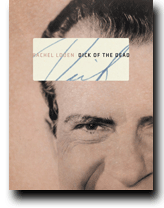
|
Dick of the Dead Rather than looking down the long murky tunnel of history, Rachel Loden erases our linear notions of time. In Dick of the Dead, her second book of poems, time equals place, so that we are in the Nixon years or the sixth century as well as the now, all acts constantly being performed, the ill-doing of anyone and his comeuppance a seamless rise and fall as if in a fountain of cause and regret. This blurring of period occurs as early as the second poem, “What the Gravedigger Needs,” which lists both an “iron spear to loosen up the frozen ground” and a “bicycle to go from grave to grave.” In Loden’s zestful, multitudinous world, stories and realities are likewise enjoined. References to movies, mythologies, fairy tales, politics, songs, the canon bump up against each other and mesh to create poems that ask us to reconsider what we know. Rather than confusing the reader, the assurance of Loden’s voice carries us through her gleeful readiness to knock down preconceived constructions. References to Nixon pepper the book. as if he’s a kind of spice or ingredient that will round out the flavors of corruption, sometimes in a minimal way such as the last lines of “Props to the Twentieth Century” which refers to a “last dish of cottage cheese/ and ketchup,” sometimes more overt as in “In the Graveyard of Fallen Monuments” where Nixon reflects: “Those were good times. The world on a razor/ of our mutually assured destruction, and yet—// comrade! you remember—we felt strangely free.” Other political figures appear as well—“Dubya woke up by the begonias,” “Lenin, firm and pliant// from his glycerine bath.” “Cheney Agonistes” opens, “My heart tick-tocking like Captain Hook’s clock.” Several poems are written as an homage to earlier poets. “The Sylvia Plath Story” begins: “First, are you our sort of a villain?” And “I Know a Brand” retains the exuberance of Robert Creeley’s original but fashions it to become a questioning of consumer lust. This low-key theme surfaces throughout the book. Not only the cartoonish bulk of the political figure is complicit in the world we make. When the speaker of “The Nixon Tapes” says, “God// damn, twelve princesses dance their shoes/ to tatters all night in a castle underground// and nobody is running their income tax/ returns?” the heedlessness of the carousers is also called into question. Even the recurring references to fairy tales, the more traditional kind where someone gets their eyes pecked out, suggests both the gullibility of the actors and their eventual ends. Loden is a thinking poet who writes funny, well-crafted poems, who savors language and is lavish with image. And still she is clear about the agonizing wrongness of the world: whenever, somewhere in the world, is in sudden need of slaughtering; light up their jet-fuel cigarettes intention smears them extravagantly (from “The Toy Box of My Intentions”)
--Susan Grimm Susan Grimm is a native of Cleveland, Ohio. Her poems have appeared in West Branch, Poetry East, Rattapallax, The Journal, and other publications. In 1996, she was awarded an Individual Artists Fellowship from the Ohio Arts Council. Her chapbook, Almost Home, was published by the Cleveland State University Poetry Center in 1997. In 1999, she was named Ohio Poet of the Year by the Ohio Poetry Day Association. Her book of poems, Lake Erie Blue, was published by BkMk Press in 2004. She edited Ordering the Storm: How to Put Together a Book of Poems which was published by Cleveland State University Poetry Center in 2006.
|
